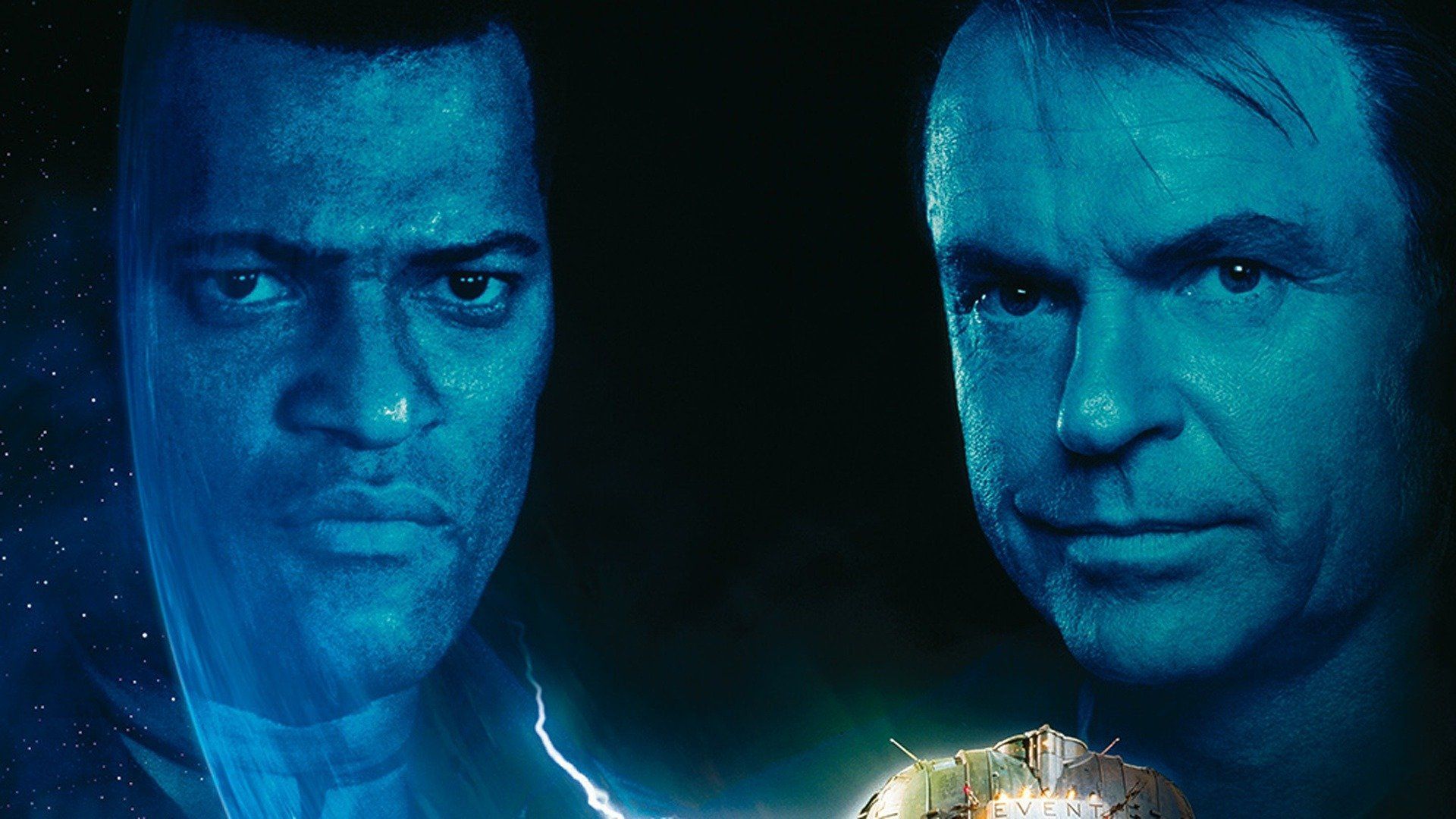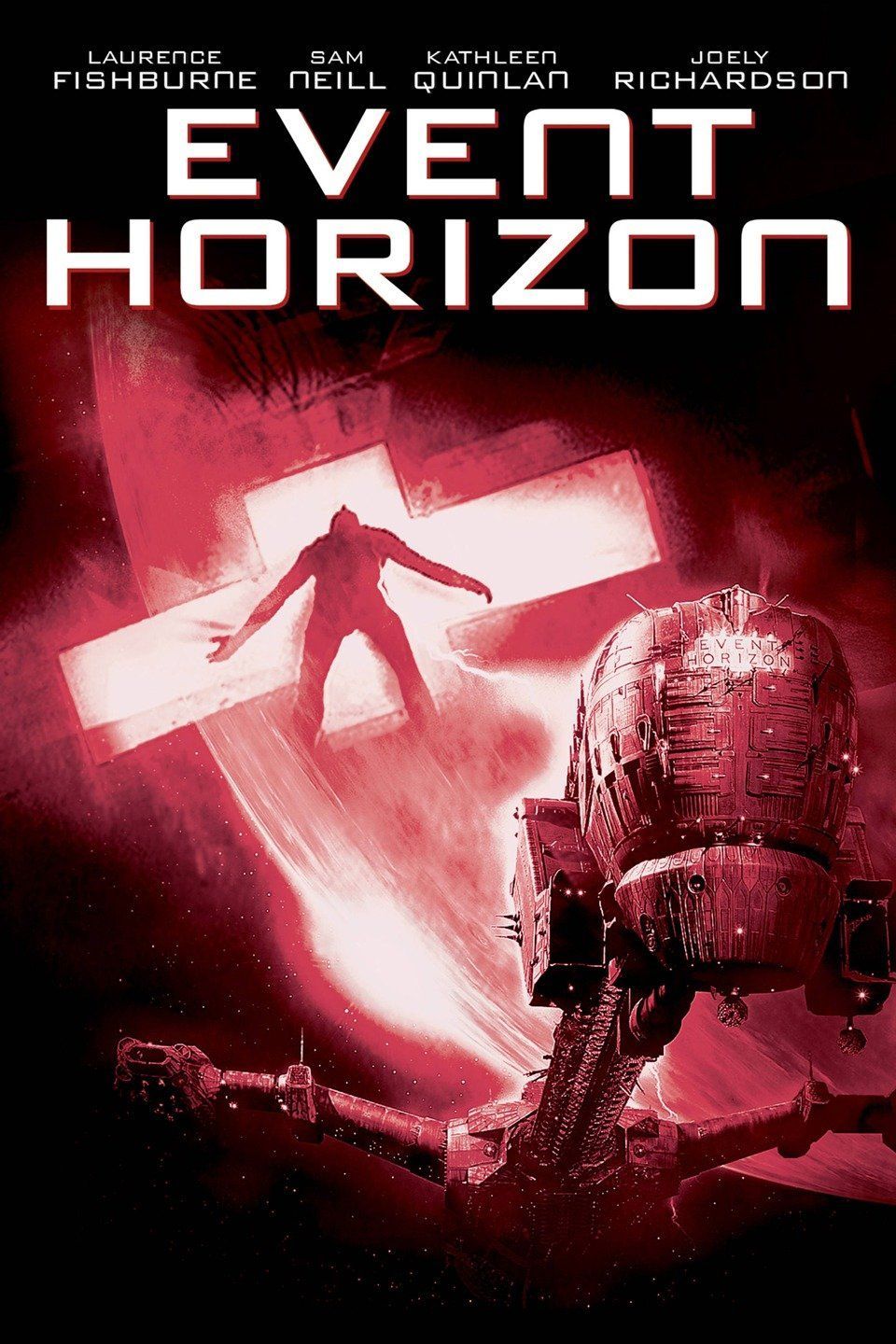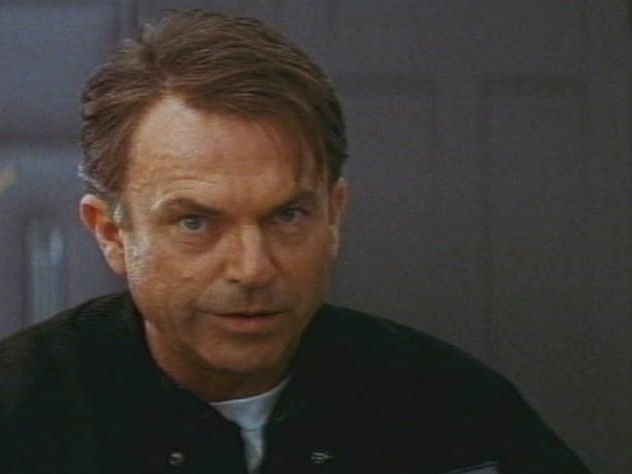

Event Horizon
Directed by Paul W. S. Anderson6.636%62%
In the year 2047, a group of astronauts are sent to investigate and salvage the long-lost starship Event Horizon. The ship mysteriously disappeared seven years ago on its maiden voyage, and with its return comes even more mystery as the crew of the Lewis and Clark discover the real truth behind its disappearance and something even more terrifying.
Cast of Event Horizon
Event Horizon Ratings & Reviews
- jbuchanan1980June 10, 2025Good fun. Bonkers and thin plot. Special effects have aged.
- Johan PotgieterJune 6, 2025The special effect look dated as you would expect from a 30 year old movie. It was not a wow movie but ok for a lazy Sunday afternoon watch. Don't expect to much and you will not be disappointed.
- RipLinesManApril 20, 2025When comparing Event Horizon (1997) to Event Horizon (1997), one might expect redundancy—but instead, what unfolds is a recursive nightmare, a Möbius strip of horror cinema that folds terror into itself. No matter which angle you enter from, it feels like another layer is waiting, another descent into the same suffering, but told by a darker voice. Like two mirrors facing each other in a cathedral of fire, the film reflects its own torment back and forth until only darkness remains. In terms of atmosphere, Event Horizon (1997) edges itself out only by the thickness of the blood in its airlocks. It's drenched in dread, but somehow manages to make even silence feel like a character screaming under its breath. The ship breathes like a beast baptized in sulfur, its walls exhaling rot and prophecy. Every corridor is a sermon from the damned, echoing with the cries of saints turned sinners. The air onboard is not oxygen—it’s purgatory made breathable. Even the silence has weight—a leaden pause before damnation reads your name aloud. The absence of life is not emptiness here; it's judgment made visible. The characters, as written, as performed, as condemned, are not merely people—they're archetypes shaped by guilt. Captain Miller is the reluctant guardian standing at the gates of a ship-shaped Gehenna. Dr. Weir is a fallen oracle pulling back the veil not to escape damnation, but to embrace it. Their confrontation is not a climax—it’s a theological argument conducted through screams and imploding metal. Every crew member carries a cross, whether etched in regret or forged in memory. Justin’s journey into the void is a baptism by vacuum. Peters doesn’t just grieve—she is devoured by it. D.J. meets his fate with eyes open, as if recognizing his tormentor like an old friend. Characters don’t board the Event Horizon—they are summoned. The ship itself is not a vessel but a sanctum of pain. It generates sin the way a furnace emits heat: constantly, unconsciously, eternally. The gravity drive isn’t a machine—it’s a sacrificial altar, a heart of black iron pumping regret. The log recording the screams of the previous crew plays like a hymn sung in reverse, a gospel of torment carried across dimensions. The ship doesn’t return from somewhere—it brings somewhere back with it. The ship’s return from beyond is not an event—it’s an infection. Its presence isn’t narrative—it’s parasitic, invading the film until even the structure begins to rot. You feel it in the edits, the glances, the way the characters pause—not out of fear of what’s ahead, but because they realize they’ve already been condemned. The bridge offers control—but only as illusion. The same codes, the same systems, yet power always slips through like ash through desperate fingers. No scene in Event Horizon exists to entertain. Each is a rung on a ladder descending into something unknowable. The film doesn’t escalate—it peels. Every hallucination is a sermon in reverse. Every flashback is a flaying. The camera doesn’t glide—it crawls, like a witness too afraid to speak. Visual motifs echo like ancient liturgies. The spinning core is not technology—it’s a relic of spiritual horror. The red filters, the spinning corridors—they don’t resemble veins. They are veins. The ship is alive, and it does not want you to leave. The horror is infernal—a slow-burning collapse of theology, logic, and sanity. Event Horizon doesn’t scare you—it converts you. Fire doesn’t destroy here—it sanctifies. What lies behind the core isn’t science—it’s scripture. It is knowledge twisted until it screams. Even when you blink, the images burn on. They’re not memories—they’re permanent additions to the soul’s architecture. Event Horizon is a ritual disguised as a narrative, a liturgy of suffering bound to reel and runtime. Watching it once is a haunting. Watching it again is a communion. There are no different perspectives—only recursions, each bleeding into the other, until you're unsure whether you're experiencing a film or being initiated into it. To compare Event Horizon to itself is to realize it contains its own duality. The ship is both arrival and return. The horror is both external and born of the viewer. The hallucinations are unique, but they all speak the same sermon: guilt, grief, sin, and surrender. It is a film that demands interpretation but punishes understanding. It gives you no monsters to blame—only mirrors to stare into. What separates Event Horizon from other horror is its complete conviction. There is no wink. No relief. No escape hatch. It invites you in, shows you what lies beyond reason, and dares you to blink. And whether you see it in darkness, in memory, or in dreams—hell is always watching back. To stare too long at Event Horizon (1997) is to feel it reshape itself inside you. You may forget the plot. You’ll never forget the feeling. It's not a movie you rewatch—it's a scripture you retranslate. Each viewing brings revelation. And revelation always hurts. To compare Event Horizon to itself is to stare into a spiraling void and realize the patterns aren’t reflections—they're instructions. And the more you understand, the deeper it buries itself in you. It is a monument to irreversible knowledge, a cinematic grimoire that leaves scorch marks on the soul. In the end, the question isn’t which part is better. The question is: how much can you take? And the answer is always the same—just enough to be marked by it forever.
- AngusMcNutzMarch 26, 2025Film is such a weird industry. You can be one of the most tactless, schlock, franchise-rolling filmmakers around and, somehow, you just may end up creating an insanely ambitious, genre-defining classic. If there was ever anything that came close to capturing the tension and meticulous escalation that Alien had, it’s here. Blood for the Blood God.
- NoOneKnowsSqueegoMay 15, 2025Why are you reading a review of this? Why have you not seen it yet? Science fiction / horror masterclass.
- cultfilmlikerApril 16, 2025As soon as objects started appearing on screen I had to pause to find out if this was shot in 3D. Nope! Just made in 1997!i Some of the mechanisms / effects / visuals were well-crafted and impactful! Exciting sound design!! A lot of screaming jump scares fwiw. And some intentionally uneasy direction that I enjoyed! Fun acting and concepts! Weird ending! The “heart of the ship” scene and score was essentially recreated in THIR13EN GHOSTS lol Paul WS Anderson clearly a huge fan of HELLRAISER lmao
- Matthias_812April 4, 2025Event Horizon is a hell of a gem. Legitimately being a horror film in space and lesser leaning to scifi. I don't fully understand the logistics of the ship and the plot but I'll be damned to love it forever because of the imagery. Weir is terrifying and the visions of hell are some of my favorite looking scenes in a movie. There's just nothing else like it.
- mrmerr8March 14, 2025Definitely suffers from the shortcomings of a movie of its time, but watching it through the eyes of someone watching it for the first time in the theatres, it’s certainly a good movie in the technical sense. Those punching sound effects really are goofy though.




















